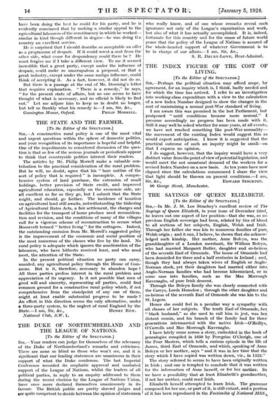THE STATE AND THE FARMER.
[To the Editor of the SPECTATOR.]
SIR,—A constructive rural policy is one of the most vital and urgent questions within the sphere of domestic politics, and your recognition of its importance is hopeful and helpful. One of the impediments to considered discussion of the ques- tion is that so few of the serious journals or periodicals appear to think that countryside politics interest their readers.
The articles by Mr. Philip Morrell make a valuable con- tribution to the practical consideration of the rural problem. But he will, no doubt, agree that his " bare outline of the sort of policy that is required " is incomplete. A compre- hensive system of land purchase, the extension of small holdings, better provision of State credit, and improved agricultural education, especially on the economic side, are all excellent as far as they go, but I submit that the State might, and should, go farther. The incidence of taxation on agricultural land still awaits, notwithstanding the tinkering of Agricultural Rates Acts, a fair settlement, the charges and facilities for the transport of home produce need reconsidera- tion and revision, and the conditions of many of the villages call for a vigorous scheme of reconstruction to secure what Roosevelt termed " better living " for the cottagers. Indeed, the outstanding omission from Mr. Morrell's suggested policy is the improvement of the economic and social position of the most numerous of the classes who live by the land. No rural policy is adequate which ignores the amelioration of the labourers, who have hitherto received least, and who need most, the attention of the State.
In the present political situation no party can carry, unaided, any agricultural policy through the House of Com- mons. But is it, therefore, necessary to abandon hope ? All three parties profess interest in the rural problem and appreciation of its urgency. Is it not possible that men of good will and sincerity, representing all parties, could find common ground for a constructive rural policy which, if not comprehensive from the standpoint of any one of them, might at least enable substantial progress to be made ? An effort in this direction seems the only alternative, under a three-party system, to the neglect of rural England by the














































 Previous page
Previous page